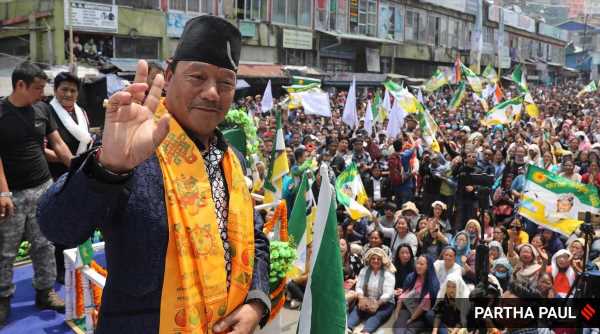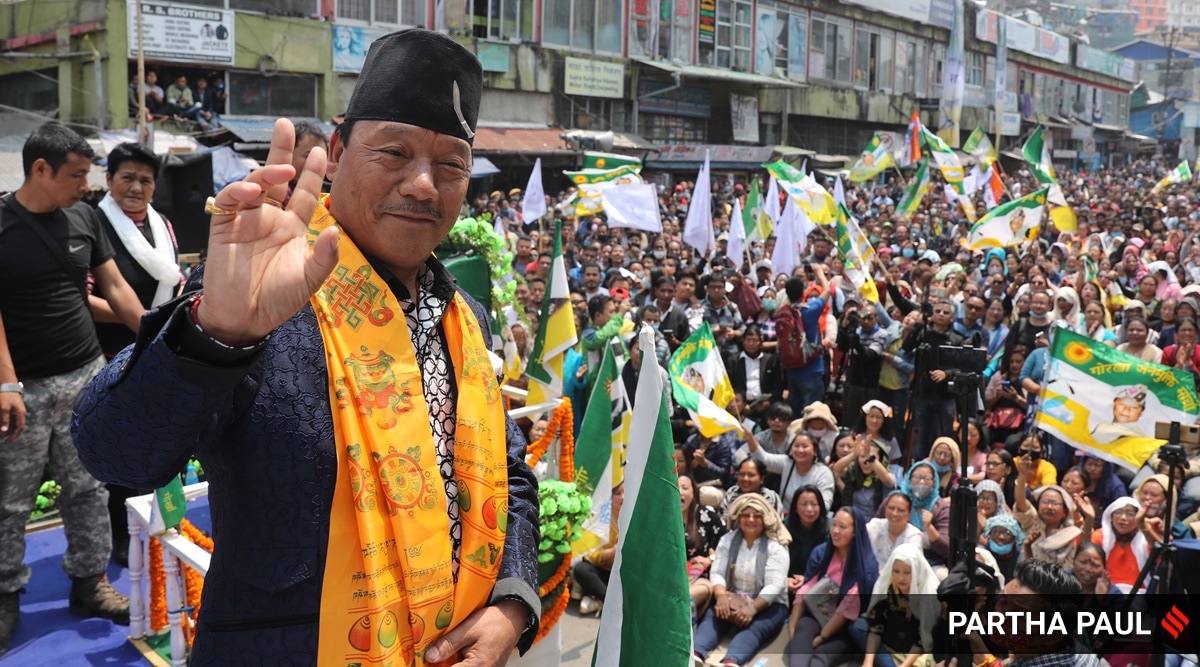Deep in his heart, Susant, a tea stall owner, still nurses the hope of a separate state. "Why not? Our language, lifestyle are different. At least, give us some powers so that we can utilise the revenue we get from tea gardens and tourism.”
FROM the speeches of political parties to the daily lives of voters, Gorkhaland does not echo anymore in the Darjeeling hills. What resonates, again and again, is the fear of another lockdown, and what it will do to an economy revolving around tourism.
Standing beside the iconic Batasia mountain rail loop of the Darjeeling Himalayan Railway, Bishal Tamang, 34, says, “So many agitations, so many deaths. All in vain. Everyone let us down.” While their longing for a separate identity remains in their hearts, he adds, “Our bellies are tied with tourists. Another lockdown will finish us… We work in tea gardens or as drivers, run stalls or restaurants. A few lucky ones work outside or have a job in the Army.”
Gorkhaland has also taken a blow due to the split among the Gorkha leaders spearheading the agitation for a separate state, making the fight in the hills a three-cornered one this time. If the Gorkha Janmukti Morcha founder-president Bimal Gurung, the one-time protege of the late Subhas Ghising, has changed sides from the BJP to the ruling Trinamool, the BJP has with it the Ghising GNLF, led by Ghising’s son Mann.
Both Gurung and another GJM faction, led by Binay Tamang, the president of the Gorkhaland Territorial Administration (GTA), have fielded Independents for the three seats of Darjeeling, Kalimpong and Kurseong, backed by the TMC. Besides these three constituencies, which vote on April 17, the Gorkha vote is important in at least four neighbouring seats.
Amit Shah has led the BJP campaign, promising an SIT to probe killings during the two Gorkhaland agitations in the 1980s as well as in 2017, that saw an 104-day shutdown. He has also stated repeatedly that an NRC (National Register of Citizens) will have no effect on the Gorkhas.
Bishal, an ITI diploma holder in automobile engineering who now runs a small garments shop, lists what are their concerns. “This is the peak season but tourist flow is already 70% down… We will get rations if there is a lockdown, but there will be no income. What about our expenses, medicines, education? I got my three-year-old daughter admitted to a school recently, I had to pay Rs 35,000.”
Running a tea and snacks stall nearby, Susant Tamang (46) says that unlike previous polls, people are confused. “Earlier people simply voted for the predominant Gorkha parties. But this time Gorkha leaders are all with the TMC. Should we vote for a Gorkha party that stands with the TMC government?”
Deep in his heart, Susant still nurses the hope of a separate state. “Why not? Our language, lifestyle are different. At least, give us some powers so that we can utilise the revenue we get from tea gardens and tourism.”
The GTA, set up in 2011 as a semi-autonomous administrative body for the Darjeeling hills, replacing the Darjeeling Gorkha Hill Council, is seen to have failed in its ambitions.
In 2016, the GJM, then an ally of the BJP, had won all the three seats of Darjeeling, Kalimpong and Kurseong. However, a bypoll in 2019 to the Darjeeling seat had been won by the BJP’s Neeraj Zimba (he has been fielded again). Since 2009, the BJP has also been winning the Darjeeling Lok Sabha seat.
However, Gurung’s defection to the TMC is expected to hurt the BJP. In October last year, after being on the run for three years, Gurung had surfaced dramatically to announce that he was leaving the BJP for its failure to implement the Gorkhaland promise and joining the TMC.
In the tea gardens of Tukvar, about a kilometre from Gurung’s house, which was ransacked during the time he was missing, Ismit Gurung and Pinky Thapa argue over who helped the people out during the Covid lockdown.
Ismit, a tea garden worker whose husband works as a driver, says, it was Prime Minister Narendra Modi. “Tea gardens had a month-long lockdown, but in village, it lasted months.”
“I think the state government gave us rations,” counters Pinky, whose husband is a primary school teacher. Adding that the area lacks even basic essentials like doctors, she says, “I do not know much about politics. But I believe Gorkhaland will not happen.”
Samir Singhal, the treasurer of the Darjeeling Hotel Owners’ Association, says, “Many hotels are running without any occupants, a few are 10% full. There is no help from the administration.”
Manning the reception of one such hotel is Bhaichung Bhutia, 28, who is proud of his association by name to the former Indian football skipper (who incidentally lost the 2016 Assembly polls from Siliguri, standing on a TMC ticket). “I used to work at the Velana International Airport in Maldives, earning $1,000 a month.” He returned just before the lockdown. “Now I get Rs 7,000 per month.”
The hotel management diploma holder adds, “As they say in Nepali, Gorkhaland is like a fruit that will never grow.”
Born in Darjeeling but an “outsider” all 65 years of his life, Vimal Khanna, whose sports gear shop overlooks the Kanchenjunga, says, “Bengal may not agree but a BJP government here can help in permanent settlement of the Gorkhaland issue.” The three seats may not be much in an Assembly of 294, but the BJP seems to realise their importance, he points out. “Amit Shah himself is campaigning here.”
Source: Read Full Article


